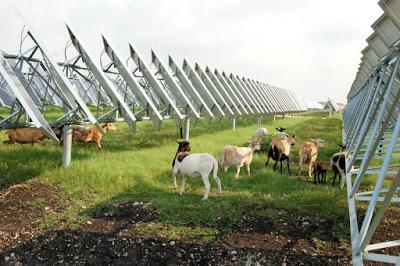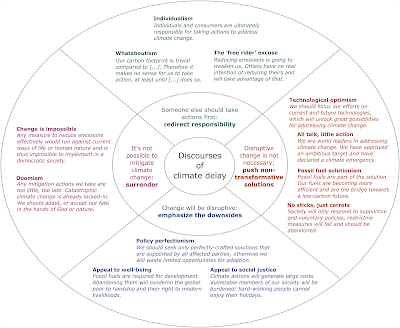
Discourse of Climate Delay (art by Léonard Chemineau, based on the diagram below)
by Jon Phillips
Commercial technologies currently exist that can transform the entire electricity generating sector. No new technology is required to take action. All that’s required is to agree and develop the practical legal basis to rapidly ramp up that transformation. Detailed studies of at least two practical approaches have already been done. Transportation and land use sectors are more difficult than electricity. But parts of those sectors can already be addressed and there’s nothing in the way of moving forward except a lack of agreement to do so in legislative bodies at Federal and State levels. You don’t have to have the full solution to make enormous progress. We should make increased electrification of transportation a direct link to the electricity sector approach and get moving on that. Even Germany’s ill advised approach may work out in the end. Certainly it’s better than doing nothing. In a decade or two, they’ll be in an ideal place to reverse their anti-nuclear stance and accept new and far safer technology to back a renewables rich infrastructure that they’re currently building. Then they could quickly expunge nearly all coal (they’re still using coal) and quite a bit of natural gas backing. Hydrogen production and large fuel cells are proto-existing technologies that are certainly more competitive than solar — which they’re over installing all over the place at tremendous cost. Ultimately, carbon pricing is the solution and that’s a matter of law and regulations. It would immediately spur infrastructure transition (which means a huge source of labor and technical jobs that cannot be offshored). If we could make rapid progress on electricity and on electrification of the personal transportation market, plus some big mass transit markets that could use rail, that would be a great start. Harder targets like air transportation and commercial trucks might resolve more easily later. Agriculture, meat production, and forestry practices require revamping. We should press hard on building codes to require more energy efficiency and installations of passive and active solar solutions that already exist.

Dual Axis Trackers (pv magazine)

William F. Lamb, et al., in Global Sustainability, Vol 3, 2020
The real problem isn’t technology and know how, it’s lack of agreement to put laws and regulations in place. All of the excuses above are just a dodge to avoid even the slightest near term inconvenience of groups of individuals (same psychology as NIMBY). Human psychology is far more attuned to what will happen today and tomorrow than in decades to come. It’s that same reason people get mired in revolving credit debt. The inability to suppress the urge to seek immediate self gratification is very destructive.

